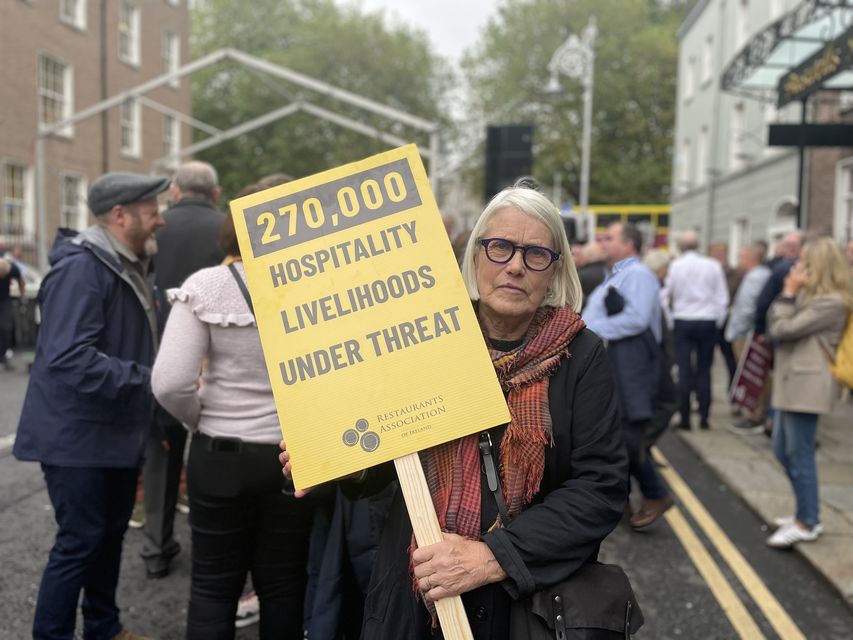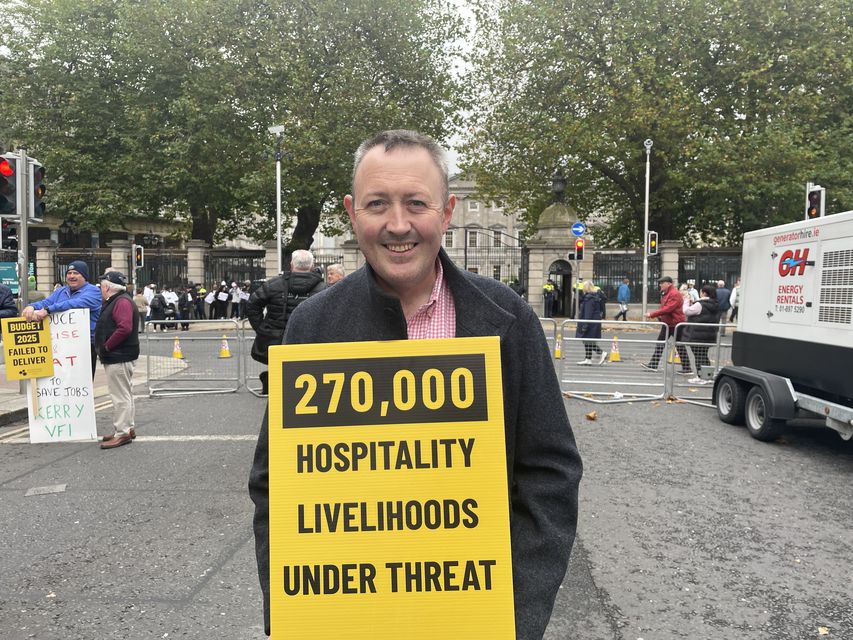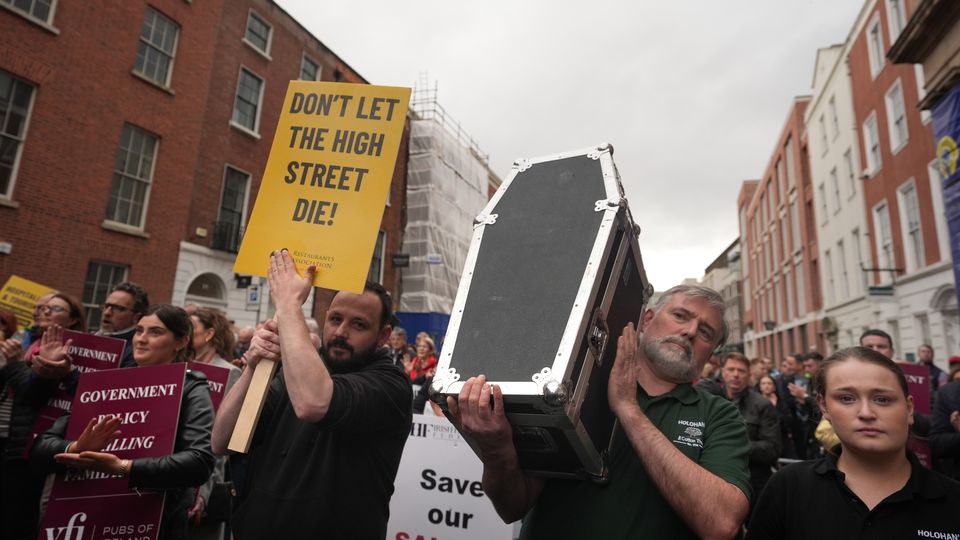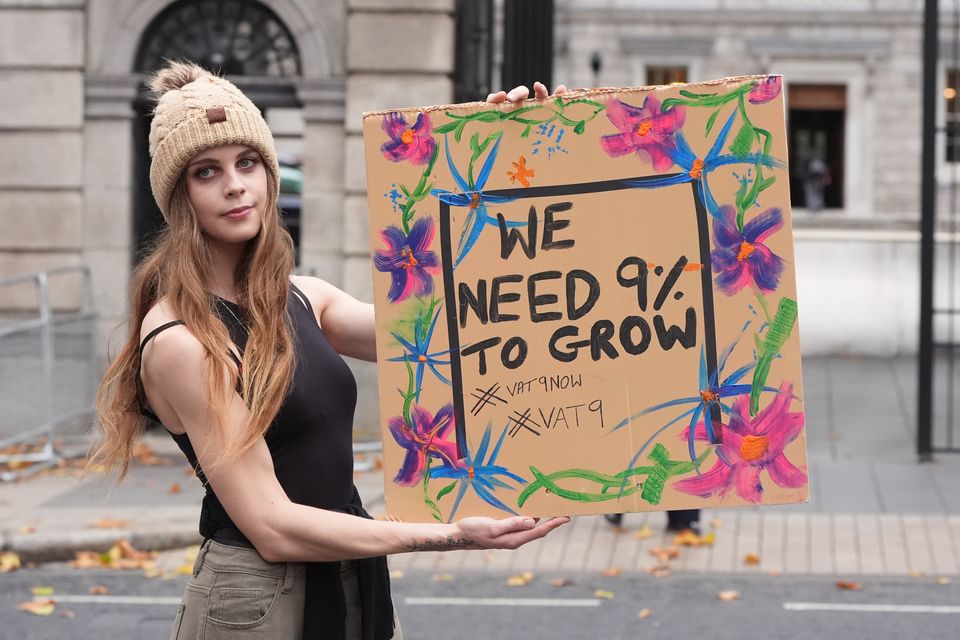Businesses need more support from government to deal with a “tsunami” of costs or the main streets of Irish towns will be left “hollowed out”, a protest heard.
The owners of restaurants, cafes and pubs, supported by groups such as ISME, the hairdressers’ association and the childcare sector, marched past the Department of Finance to Leinster House on Tuesday over the lack of support offered to small and medium-sized businesses (SMEs) in Budget 2025.
Irish chef and founder of the Ballymaloe Cookery School Darina Allen described the situation as ‘tough’ for small restaurants and cafes (Grainne Ni Aodha/PA)
Irish chef and founder of the Ballymaloe Cookery School Darina Allen was among those who gathered outside Leinster House to highlight the high costs facing small and medium-sized businesses (SMEs).
She told the PA news agency that it’s “definitely, definitely tough”, particularly for small restaurants and cafes relying on “a couple of cents on a coffee”.
“People are not whingeing for the sake of whinging, they are not exaggerating,” she said.
“I think a lot of people think, when they see a restaurant very busy at the weekend, people think they’re making a fortune. But it’s a whole tsunami of rising costs and anybody who wants to do really good food using really good quality ingredients, the cost of food has gone up by 300-400% and I don’t resent that, because I know a lot of farmers are not being paid enough to cover the costs of producing good food.
“Something has to be done. They’re right when they say the government has to wake up and listen to the people.
Michael Coyne of Coyne’s Gastropub in Kilkieran in the Connemara Gaeltacht says that every week a supplier raises a new cost increase for businesses to shoulder (Grainne Ni Aodha/PA)
“Why? Why have they not done it? What is the logic? It’s very hard. I’m not a politician, but I could not see the logic of it in financial terms.
“They need to work with us because we’re all entrepreneurs. We love what we’re doing. We want to generate income, we want to generate employment.
“For the sake of Ireland Inc, for the sake of the colour, the joy, everything, we really have to move the dial on this one.”
Michael Coyne is the fifth generation of his family in charge of Coyne’s Gastropub in Kilkieran in the Connemara Gaeltacht.
He drove for four hours to attend the protest on Tuesday – after giving an Irish history lecture at a further education institute to compensate amid rising costs.
“Every week from a supplier, I get an ‘I’m sorry, but we have to increase this price or that price’.
“I have nothing against an increase in wages. If you work hard, you deserve every penny you get. But you can’t expect businesses to work within the margins,” he told PA.
“There’s no damn way I’m closing. We opened in 1892, we saw off the British, two world wars, a global pandemic, we’re going to be here, but I’m sick and tired.”
People from the hospitality and retail sectors take part in a march to Leinster House, Dublin, to highlight the high costs facing small and medium-sized businesses (Niall Carson/PA)
He said that if one government candidate comes near his business in the coming weeks, “they better have their trainers on”.
Former minister and broadcaster Ivan Yates directed the speakers at the demonstration, organised by the Restaurants Association of Ireland and the Vintners Federation of Ireland.
Business owners have argued that soaring energy costs, inflated costs of supplies and ingredients, added to budget changes such as increases to the minimum wage in January and the expansion of sick leave, are placing “immense strain” on SMEs, particularly in the hospitality and retail sectors.
Business groups have argued that the Power Up grant of 4,000 euros in the budget averages out as only an extra 77 euros a week and will not make “any significant dent” in the cost increases facing businesses.
Chief executive of the Restaurants Association of Ireland Adrian Cummins said that this was the start of a “groundswell movement”.
“It’s very tough out there at the moment for businesses, especially in the food-led sector that I look after – restaurants, coffee shops – we’ve seen over 700 closures in the last 13 months. It just can’t continue like that.”
He said that decoupling cafes and restaurants out of the 13.5% hospitality VAT rate and bringing in a separate VAT rate for them would be a “silver bullet”.
“Your high street is getting hollowed out. It’s not easy for these businesses to survive in regional, rural Ireland, and you saw Galway City Council there only last week proposing increased rates. That’s another issue we have to deal with.
“When will there be a realisation that there’s something needed, specifically a bespoke package for hospitality? We are crying out for this over the last 12 months, and we actually need a dedicated minister that’s going to look after us.”
Chef Nicole Whitaker takes part in a protest outside Leinster House, Dublin calling for a reduction in VAT for SMEs (Niall Carson/PA)
Speaking on Monday afternoon, Public Expenditure Minister Paschal Donohoe said the budget “did what it could to help” businesses and that reducing the VAT rate from 13.5% to 9% would have cost at least 600 million euros.
He said income tax changes would help SME employees and their customers, but added that the government will “continue to engage” with the sector.
“I know there was a long-standing case for changes in relation to VAT, but any of the changes in relation to VAT would have cost many, many hundreds of millions of euros, anywhere between 600 and 800 million euros, I believe, which meant that there were other things that we would not have been able to do within the budget.”
He added: “While I understand the need that is there to break each budget down into individual parts, overall, what this and other budgets have aimed to do is create an environment in which our economy is growing, which has high levels of employment, and there’s the demand for the goods and services that small and medium-sized businesses supply.”



